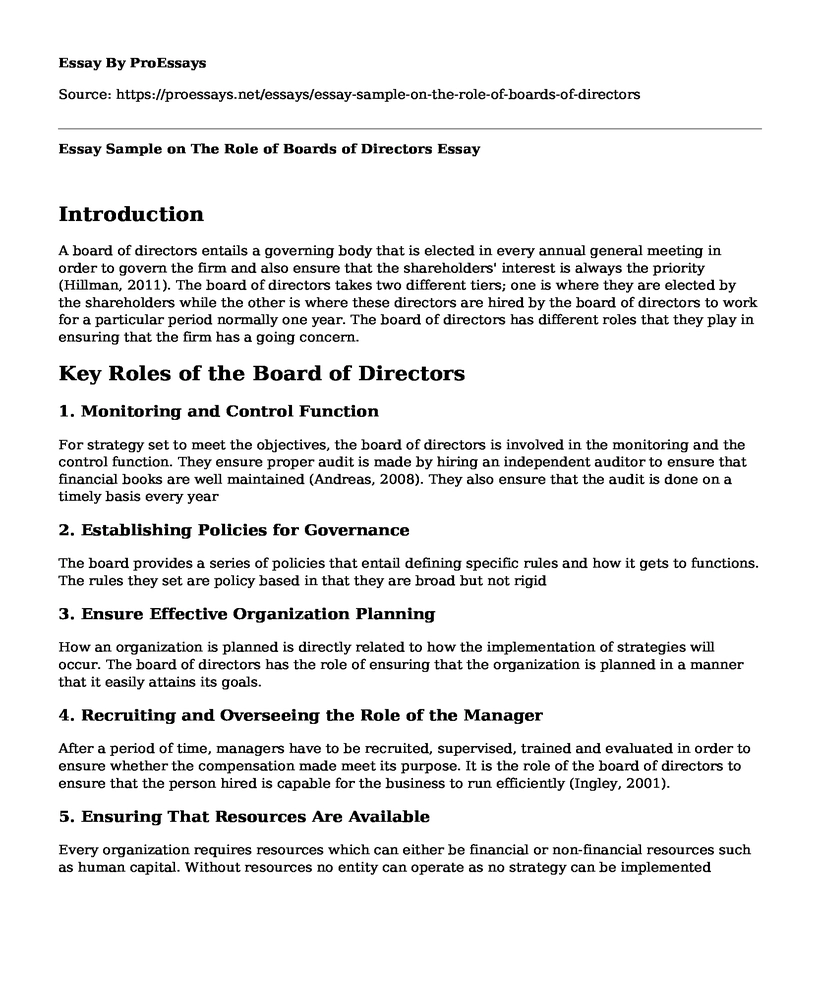Introduction
A board of directors entails a governing body that is elected in every annual general meeting in order to govern the firm and also ensure that the shareholders' interest is always the priority (Hillman, 2011). The board of directors takes two different tiers; one is where they are elected by the shareholders while the other is where these directors are hired by the board of directors to work for a particular period normally one year. The board of directors has different roles that they play in ensuring that the firm has a going concern.
Key Roles of the Board of Directors
1. Monitoring and Control Function
For strategy set to meet the objectives, the board of directors is involved in the monitoring and the control function. They ensure proper audit is made by hiring an independent auditor to ensure that financial books are well maintained (Andreas, 2008). They also ensure that the audit is done on a timely basis every year
2. Establishing Policies for Governance
The board provides a series of policies that entail defining specific rules and how it gets to functions. The rules they set are policy based in that they are broad but not rigid
3. Ensure Effective Organization Planning
How an organization is planned is directly related to how the implementation of strategies will occur. The board of directors has the role of ensuring that the organization is planned in a manner that it easily attains its goals.
4. Recruiting and Overseeing the Role of the Manager
After a period of time, managers have to be recruited, supervised, trained and evaluated in order to ensure whether the compensation made meet its purpose. It is the role of the board of directors to ensure that the person hired is capable for the business to run efficiently (Ingley, 2001).
5. Ensuring That Resources Are Available
Every organization requires resources which can either be financial or non-financial resources such as human capital. Without resources no entity can operate as no strategy can be implemented
6. Fiduciary Role
This entails protection of the investment and assets of the members. With this, the board of directors will have protected the members' interests as all assets including the human capital are in order for proper functioning.
7. Provides Direction for the Organization
Directors are required to ensure that the entity gets to know the mission, vision and the goals of the corporate to ensure their consistency with their strategies. With this, the entity will progress.
Reference
De Andres, P., & Vallelado, E. (2008). Corporate governance in banking: The role of the board of directors. Journal of banking & finance, 32(12), 2570-2580.
Hillman, A. J., Keim, G. D., & Luce, R. A. (2001). Board composition and stakeholder performance: Do stakeholder directors make a difference?. Business & Society, 40(3), 295-314.
Ingley, C. B., & Van der Walt, N. T. (2001). The strategic board: The changing role of directors in developing and maintaining corporate capability. Corporate Governance: An International Review, 9(3), 174-185.
Cite this page
Essay Sample on The Role of Boards of Directors. (2022, Nov 14). Retrieved from https://proessays.net/essays/essay-sample-on-the-role-of-boards-of-directors
If you are the original author of this essay and no longer wish to have it published on the ProEssays website, please click below to request its removal:
- Appropriate Portfolio for the XYZ to Allocate Fund and Additional Resources
- International Cyber Crime(S) That Happen Related To Information Security on Web Servers
- Similarities Between Skills Approach and Trait Theory - Research Paper
- Essay on Financial Risk Management Failures at Colleges & Universities
- Paper Example on Leadership & Management: Reflective Learning & ORGL Courses
- Essay Example: Maximizing Profits with Unique Management Tactics & Leadership Styles
- Business Strategy - Free Report Sample







